2018中考语法讲解与练习7——情态动词
中考英语情态动词用法总结

中考英语情态动词用法总结情态动词是英语中一种特殊的动词形式,用来表示说话人的情态和态度,以及表示可能性、能力、推测、请求、命令等。
以下是中考英语常见的情态动词及其用法总结:1. can/could-表示能力或允许做事- 例如:I can swim.(我会游泳。
)- 例如:Could I borrow your pen?(我可以借用你的钢笔吗?)2. may/might-表示可能性、许可或请求允许- 例如:It may rain tomorrow.(明天可能会下雨。
)- 例如:May I use the restroom?(我可以去洗手间吗?)3. must-表示必须或肯定性- 例如:You must finish your homework before going out.(你必须先做完作业才能出去。
)- 例如:He must be tired.(他一定很累。
)4. should-表示建议、义务或期望- 例如:You should eat more fruits and vegetables.(你应该多吃水果和蔬菜。
)- 例如:You should apologize for what you said.(你应该为你说的话道歉。
)5. would-表示愿意、习惯或请求礼貌- 例如:Would you like some tea?(你想要些茶吗?)- 例如:He would always help others.(他总是愿意帮助别人。
)6. will/would-表示将来时态或意愿- 例如:I will visit my grandparents next weekend.(下个周末我将去看望我的爷爷奶奶。
)- 例如:Would you like to join us for dinner?(你愿意和我们一起吃晚饭吗?)需要注意的是,情态动词本身不变化,没有人称和数的变化。
它们后面接原形动词,表示动作或状态。
2018届中考英语复习课件:语法 情态动词(共39张PPT)

考点七:should意为“应该”,既可以表示 义 务或责任,还可以表示劝告或建议。其否定 式为shouldn’t,意为“不应该”。如: You should read his new book. It’s really interesting. Children shouldn’t be allowed to play in the street. 考点八:had better do sth.意为“最好做某 事”,其否定式在better后加not。如: You’d better (not) see the film yourself. 考点九:need表示“需要”,作情态动词时, 通常用于否定句或疑问句中。
情态动词不能单独作谓语,它必须和动词 原形连用一起构成谓语。 一、情态动词的情态意义表示法 考点一:can可表示现在或将来的能力, 意为“能;会”。can还可表示请求、允 许,意为“可以”。如: Gabriella can speak French fluently. Can you help me lift this box?
5. You ________ take me to the station. My brother's taking me. A. can't B. mustn't C. shouldn't D. don' t have to (2016 江西)
6. Jenny finally got the job because she ______ speak English well. A. might B. must C. could (2015 广东佛山)
考点四:might表示允许时,语气比may更 加委婉和客气。如: Might I borrow your pen? 考点五:must表示义务、命令或必要,意 为“必须”,强调主观看法。mustn’t表示 “不 允许;禁止”之意。如: All passengers must wear seat belts. You mustn’t talk to your mother like that. 考点六:have to意为“不得不”,强调客 观 需要。如:
2018年中考英语易错知识点讲练【情态动词】.doc
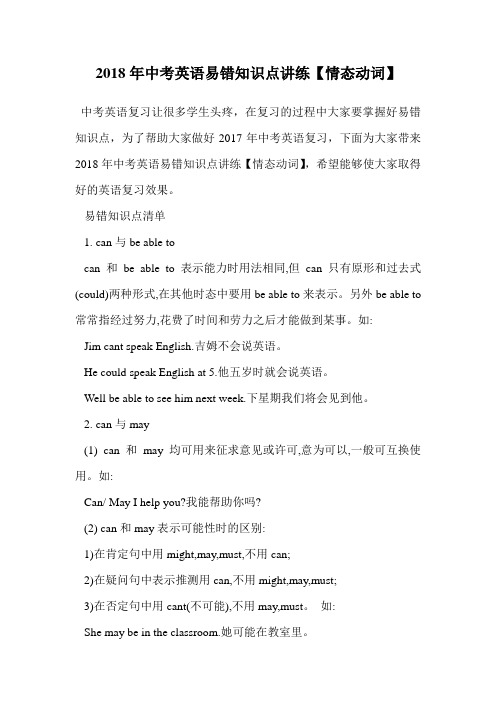
2018年中考英语易错知识点讲练【情态动词】中考英语复习让很多学生头疼,在复习的过程中大家要掌握好易错知识点,为了帮助大家做好2017年中考英语复习,下面为大家带来2018年中考英语易错知识点讲练【情态动词】,希望能够使大家取得好的英语复习效果。
易错知识点清单1. can与be able tocan和be able to表示能力时用法相同,但can只有原形和过去式(could)两种形式,在其他时态中要用be able to来表示。
另外be able to常常指经过努力,花费了时间和劳力之后才能做到某事。
如:Jim cant speak English.吉姆不会说英语。
He could speak English at 5.他五岁时就会说英语。
Well be able to see him next week.下星期我们将会见到他。
2. can与may(1) can和may均可用来征求意见或许可,意为可以,一般可互换使用。
如:Can/ May I help you?我能帮助你吗?(2) can和may表示可能性时的区别:1)在肯定句中用might,may,must,不用can;2)在疑问句中表示推测用can,不用might,may,must;3)在否定句中用cant(不可能),不用may,must。
如:She may be in the classroom.她可能在教室里。
Where can they be now?他们现在可能在哪儿?That cant be true.那不可能是真的。
3. may be与maybemay be中的may为情态动词, be为动词原形,在句中作谓语。
而maybe 是副词,意思是大概、也许,相当于perhaps,常放在句首,作状语。
如: He may be wrong,but Im not sure.也许他错了,但我也不确定。
Maybe shell come this afternoon.她可能今天下午来。
初中英语语法情态动词讲解与练习有答案
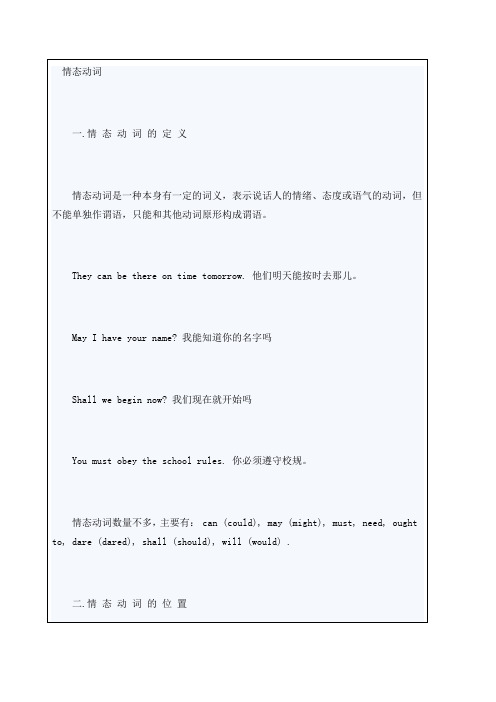
情态动词在句中放在谓语动词之前,谓语动词前若有助动词,则在助动词之前,疑问句中,情态动词放在主语之前。
I can see you. Come here. 我能看见你,过来吧。
He must have been away. 他一定走了。
What can I do for you? 你要什么How dare you treat us like that! 你怎么敢那样对待我们!三.情态动词的特点情态动词无人称和数的变化,情态动词后面跟的动词需用原形,否定式构成是在情态动词后面加“not”。
个别情态动词有现在式和过去式两种形式,过去式可以用来表达更加客气、委婉的语气,时态性不强,可用于过去,现在或将来。
我们称之为“功能用法”。
He could be here soon. 他很快就来。
May I come in? 我可以进来吗?May I use your dictionary? 我可以用你的词典吗?You may put on more clothes. 你可以多穿点衣服。
He said he might lend us some money. 他说他可以借给我们一些钱。
may 否定式为 may not, 缩写形式是mayn’t。
might 是may 的过去式,有两种用法,一种表示过去式,一种表示虚拟语气,使语气更加委婉、客气或对可能性的怀疑。
He told me he might be here on time. 他说他能按时间来。
Might I borrow some money now? 我可以借点钱吗?He might be alive. 他可能还活着。
3. must “必须;应该;一定;准是”,表示说话人认为有必要做某事,命令、You needn't have taken it seriously. 这件事情你不必太认真。
5. dare “敢”,多用在否定或疑问句中。
The little girl dare not speak in public. 小女孩不敢在公众面前说话。
2018年全国中考真题之 情态动词 考点
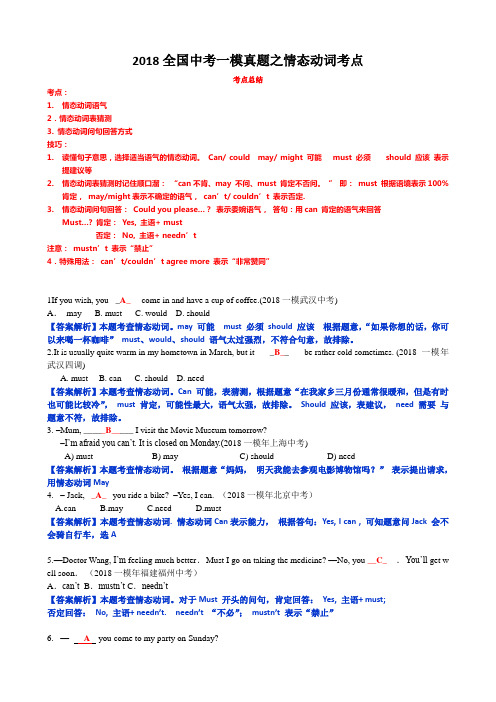
2018全国中考一模真题之情态动词考点考点总结考点:1.情态动词语气2.情态动词表猜测3. 情态动词问句回答方式技巧:1.读懂句子意思,选择适当语气的情态动词。
Can/ could may/ might 可能must 必须should 应该表示提建议等2.情态动词表猜测时记住顺口溜:“can不肯、may 不问、must 肯定不否问。
”即:must 根据语境表示100%肯定,may/might表示不确定的语气,can’t/ couldn’t 表示否定.3.情态动词问句回答:Could you please…?表示委婉语气,答句:用can 肯定的语气来回答Must…? 肯定:Yes, 主语+ must否定:No, 主语+ needn’t注意:mustn’t 表示“禁止”4.特殊用法:can’t/couldn’t agree more 表示“非常赞同”1If you wish, you __A___ come in and have a cup of coffee.(2018一模武汉中考)A.may B. must C. would D. should【答案解析】本题考查情态动词。
may 可能must 必须should 应该根据题意,“如果你想的话,你可以来喝一杯咖啡”must、would、should 语气太过强烈,不符合句意,故排除。
2.It is usually quite warm in my hometown in March, but it ____B_____ be rather cold sometimes. (2018一模年武汉四调)A. mustB. canC. shouldD. need【答案解析】本题考查情态动词。
Can 可能,表猜测,根据题意“在我家乡三月份通常很暖和,但是有时也可能比较冷”,must 肯定,可能性最大,语气太强,故排除。
Should 应该,表建议,need 需要与题意不符,故排除。
(完整word版)中考情态动词讲解

情态动词有具体的词义,但也同助动词一样,需要与其他词语一起构成句子的谓语”另外情态动词没有人称和数的变化,情态动词后必须跟动词原形。
情态动1 司有can (could), may (nught), must, have to, shall (should, will (would), dare (dared), need (needed), ought to等。
情态动词无人称和数的变化;不能单独使用,必须与其后的动词原形构成谓语。
情态动词的语法粽正1)情态动词不能表示正在发生或已经发生的事情,只表示期待或估计某事的发生。
2)情态动词除ought和have外,后面只能接不带to的不定式。
3)情态动词没有人称,数的变化,即情态动词第三人称单数不加-s.4)情态动词没有^谓语形式,即没有不定式,分词,等形式。
1. can的用法:—、can, could1)表示能力(体力、知识、技能)。
表示能力时一般译为“能、会”,即有种能力,尤其是生来具备的能力,此时may和must均不可代替它。
Can you lift this heavy box?(体力)Mary can speak tluee languages.(知识)Can you skate?(技能)此时可用be able to代替,can只有一般现在时和一般过去式;而be able to则有更多的时态。
I'll not be able to come tins afternoon.2)表示请求和允许,常在口语中。
----- Can I go now?----- Yes, you can /No, you can't.此时可与may互换。
在疑问句中还可用could, mighr代替,不是过去式,只是语气更委婉,不能用于肯定句和答语中。
-…Could I come to see you tomorrow?——Yes, you caii. (No, I'm afraid not.)3)表示客观可能性(客观原因形成的能力)。
2018届中考英语专题复习专题九情态动词(精品)

我可以要一杯茶吗?
意为“必须”,多表示主观意 愿。
You must finish your homework first!首先, 你必
须完成你的家庭作业!
意为“应该”, 表示责任和义务, We should keep the air
fresh. 我们应该保持空气清
也可以表示劝告或建议。
A. needn’t
B. mustn’t C. can’t
D. shouldn’t
4.You D take me to the station. My brother will take me there.
A. can’t
B. mustn’t
C. shouldn’t D. don’t have to
9
注意:
这几个词按照推测的可能性由大到小为:must>may>might/could。 如:They must be very tired after a long walk. 走了这么长的路, 他们一定很 累了。 The French book may be Alice’s. She studies French. 这本法语书可能是爱丽 斯的。她学法语。 She might be in the library. She likes reading books in the afternoon. 她可能在 图书馆。她喜欢在下午的时候看书。
A. might
B. must
C. could
D. should
12
our class.
A. must
B. might
C. can’t
D. have to
9.My schoolbag C still be in the music hall because I attended a concert
初中英语语法:情态动词讲解及练习
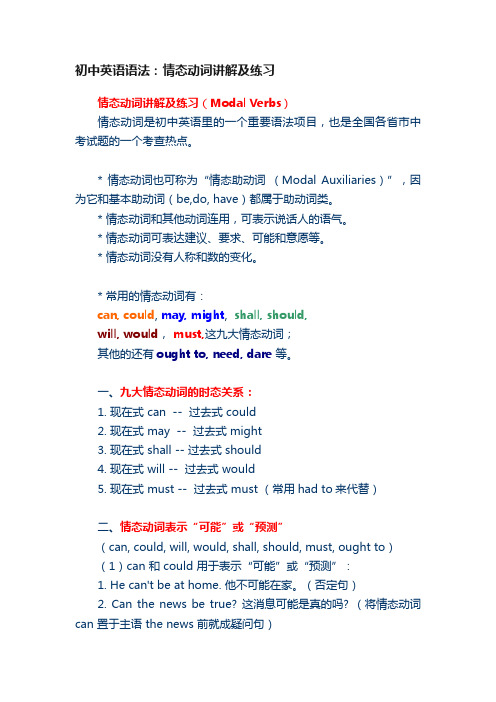
初中英语语法:情态动词讲解及练习情态动词讲解及练习(Modal Verbs)情态动词是初中英语里的一个重要语法项目,也是全国各省市中考试题的一个考查热点。
* 情态动词也可称为“情态助动词(Modal Auxiliaries)”,因为它和基本助动词(be,do, have)都属于助动词类。
* 情态动词和其他动词连用,可表示说话人的语气。
* 情态动词可表达建议、要求、可能和意愿等。
* 情态动词没有人称和数的变化。
* 常用的情态动词有:can, could, may, might, shall, should,will, would,must,这九大情态动词;其他的还有ought to, need, dare等。
一、九大情态动词的时态关系:1. 现在式 can -- 过去式 could2. 现在式 may -- 过去式 might3. 现在式 shall -- 过去式 should4. 现在式 will -- 过去式 would5. 现在式 must -- 过去式 must (常用had to来代替)二、情态动词表示“可能”或“预测”(can, could, will, would, shall, should, must, ought to)(1)can 和 could 用于表示“可能”或“预测”:1. He can't be at home. 他不可能在家。
(否定句)2. Can the news be true? 这消息可能是真的吗? (将情态动词can 置于主语 the news 前就成疑问句)3. Anybody can make mistake. 任何人都可能犯错误。
(只表示理论上的可能性)(2)may 和 might 用于表示“事实上的可能性”或“预测”:1. It may rain tomorrow. (表示可能会发生)明天可能会下雨。
2. It may snow later this afternoon. (表示预测)今天下午可能会下雪。
2018中考英语复习 第二部分 语法专题突破 专题十 情态动词课件 (新版)人教新目标版.pptx

1
1.掌握常考情态动词can,may,need,must的意义和用法; 2.掌握情态动词may,might,must,can,could等在一般疑问句中的肯定 形式和否定形式。
2
情态动词是安徽中考的必考点,预测2018年单项填空仍然会设置 一题来考查。考生在解答此类题时,一定要掌握每个情态动词的含 义,然后结合具体的语境判断出正确的答案。
I hand in the report today?
—No,you needn’t.
A.Can B.Must C.ShallD.Could
【解析】考查情态动词。句意:——今天我必须交报告吗?——不,
你没有必要。根据答语“No,you needn’t.”可以判断,前面是must引
导的一般疑问句。
【答案】 B
3
考点1 情态动词的用法 1.can的用法
用法 表示能力时意为“能,会”,即拥 有某种能力。
表示许可,常用在口语中。
表示推测,意为“可能”,常用于 否定句和疑问句中。
例句
She can swim fast,but I can’t.她游泳 能游得很快,但我不能。 You can use my dictionary.你可以用 我的字典。
10
5.need 的用法
用法
例句
用作情态动词,意为“必须,必要”,通常用于 Need I take any drinks and food?
疑问句和否定句。
需要我带一些吃的和喝的吗?
用作情态动词,通常可以用在 must 引起的 疑问句的否定回答中。
—Must I finish all the work within three hours,sir?先生,我必须在三 个小时内完成工作吗? —No,you needn’t.不,没必要。
2018年中考英语知识归纳复习专题情态动词外研版

情态动词【情态动词】情态动词表示说话者的情感、态度和语气,本身有一定的意义,但不能单独作谓语,须与动词原形一起构成句子的谓语。
情态动词没有人称和数的变化。
情态动词的基本用法要点提醒:1.can与be able to(1)相同点:后面都接动词原形;都可表示能力。
(2)不同点:can只有一般现在时和一般过去时,即can/could;可以用于否定句或疑问句中,表示判断或推测;be able to有多种时态变化以及人称和数的变化;表示“过去通过努力做成了某件事”只能用be able to。
2.must与have to(1)must表示说话人的主观意志,意为“必须”,无人称和数的变化。
其否定回答通常用don’t have to 或needn’t,而不用mustn’t。
如:—Must I finish my homework first?我必须先完成作业吗?—No,you don’t have to/needn’t.不,你不必。
(2)have to 意为“不得不”,往往强调受到外界客观因素的迫使。
它可用于多种时态,且有人称和数的变化。
如:It is going to rain.I have to go home now.快下雨了,我得回家了。
We didn’t want to go but we had to.我们并不想去但是不得不去。
3.以could开头的,表示委婉请求的疑问句,要用can回答,不能用could回答。
如:—Could I borrow this book?我能借这本书吗?—Sorry,you can’t.对不起,你不能。
【考点训练1】1.You ____ walk too close to the edge of the hill because you might fall and hurt yourselves. ()A.mustn’tB.mustC.canD.needn’t2.—Must we clean the house now?—No,you ______ .You can do it tomorrow. ()A.can’tB.needn’tC.shouldn’tD.mustn’t3.—___ I use your ruler?—Sure.Here you are. ()A.MustB.MayC.ShouldD.Need4.With the help of the new technology,you ___ e-mail your friends by mobile phone. ()A.canB.needC.mustD.might5.—How was the youth club last night,Mark?—It was great fun.You ___ come. ()A.couldB.mustC.mayD.should【情态动词表推测的用法情态】注意:could表推测时,语气比can要弱,说话者留有余地。
2018中考英语复习第二部分语法专题突破专题十情态动词课件人教新目标版

典例 ( 2017· 西宁 )—What will the weather be like tomorrow? —It be rainy,cloudy or sunny.I’m not sure. A.must B.should C.can’t D.might 【解析】考查情态动词。根据“I’m not sure.”可知,空处表示“有可 能”。 【答案】 D
专题十 情态动词
1.掌握常考情态动词can,may,need,must的意义和用法; 2.掌握情态动词may,might,must,can,could等在一般疑问句中的肯定 形式和否定形式。
情态动词是安徽中考的必考点,预测2018年单项填空仍然会设置 一题来考查。考生在解答此类题时,一定要掌握每个情态动词的含 义,然后结合具体的语境判断出正确的答案。
3.may 和 might 的用法
用法 may 表示请求,许可,意为“可以”。比 can 较 为正式,引导一般疑问句的否定形式回答应 该 can’t,或者 mustn’t。 might 是 may 的过去式,表示请求,语气更委 婉。 例句 May I look at your new collection of stamps.我可以看看你新的邮 票集吗? Might I use your phone?我可以用 一下你的电话吗? It may rain tomorrow afternoon.明 天下午也许会下雨。 may 和 might 可以表示可能性,一般用于肯 He might get there in time,but I 定句,might 比 may 可能性更小。 can’t be sure.他有可能准时到达, 但我不敢肯定。
典例 ( 2017· 河北 )I have traveled a lot.I speak four languages. A.can B.may C.must D.need 【解析】考查情态动词。句意:我已经游览过许多地方。我能讲四 种语言。根据句意可知,此处表示一种口 )—We’ve got everything ready for the trip. —You mean I bring anything with me,right? A.can’t B.mustn’t C.needn’t D.couldn’t 【解析】考查情态动词。句意:——我们已经为旅行做好了准 备。——你的意思是我没有必要带任何东西,是吗?C项“没有必要”, 符合语境。 【答案】 C
2018年湖南中考英语:情态动词
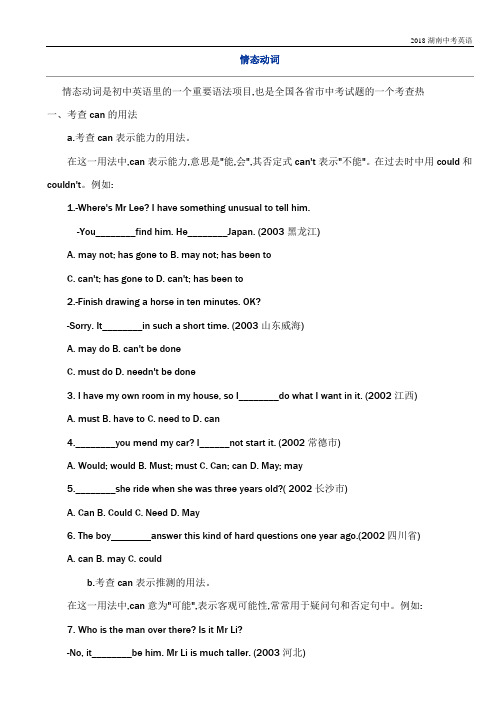
情态动词情态动词是初中英语里的一个重要语法项目,也是全国各省市中考试题的一个考查热一、考查can的用法a.考查can表示能力的用法。
在这一用法中,can表示能力,意思是"能,会",其否定式can't表示"不能"。
在过去时中用could和couldn't。
例如:1.-Where's Mr Lee? I have something unusual to tell him.-You________find him. He________Japan. (2003黑龙江)A. may not; has gone toB. may not; has been toC. can't; has gone toD. can't; has been to2.-Finish drawing a horse in ten minutes. OK?-Sorry. It________in such a short time. (2003山东威海)A. may doB. can't be doneC. must doD. needn't be done3. I have my own room in my house, so I________do what I want in it. (2002江西)A. mustB. have toC. need toD. can4.________you mend my car? I______not start it. (2002常德市)A. Would; wouldB. Must; mustC. Can; canD. May; may5.________she ride when she was three years old?( 2002长沙市)A. CanB. CouldC. NeedD. May6. The boy________answer this kind of hard questions one year ago.(2002四川省)A. canB. mayC. couldb.考查can表示推测的用法。
初中英语语法专题讲座—情态动词(含练习及答案)

初中英语语法专题讲座——情态动词【复习要点】一、情态动词的特点:情态动词,又叫情态助动词。
它们具有以下特点:⑴它们必须与其他动词连用,即:情态动词+动词原形,表示说话人对所述动作的看法,如需要、可能、意愿或怀疑等。
⑵绝大多数情态动词没有人称和数的变化,即第三人称单数不加-s(以be和have 开头的情态动词短语除外)。
⑶在意义上,情态动词具有“多义性”。
例如:can既可表示能力,又可表示可能、允许等意义。
二、部分情态动词的基本用法:1. can的基本用法:⑴表示体力或智力上的能力,即“能够,会”,可与be able to转换。
例如:He can speak English. / He is able to speak English. 他会讲英语。
Can you play basketball? — No, I can’t. 你会打篮球吗?——我不会。
如果表示将来具备的能力,要用will be able to。
例如:If I have a good sleep, I will be able to do the problem. 假如我睡个好觉,我就能做那道题目了。
⑵表示许可,主要用于口语,书面语一般用may。
例如:Can we go home now, please? — No, you can’t. 我们可以现在就回家吗?——不可以。
You can only smoke in this room. 你只能在这间房间里抽烟。
You can’t keep the library books for more than a month. 图书馆的书借期不可超过一个月。
⑶表示“可能”,与may同义,但一般用在疑问句中。
例如:What can he possibly want? 他可能会想要什么呢? 另外,在否定句中,否定形式can’t表示推测“不大可能”。
例如:Anybody can make mistakes. 任何人都可能会犯错误。
中考英语---情态动词的专项讲解+练习
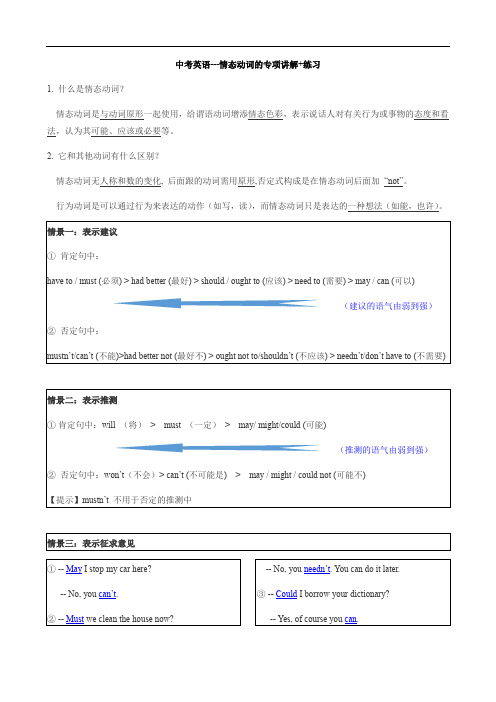
中考英语---情态动词的专项讲解+练习1. 什么是情态动词?2. 它和其他动词有什么区别?谓语动词的情态(2)1.还记得上一讲中,涉及到的人对事物或行为的情感和态度有哪些?涉及的态度有:应该,可能,敢,将要,可以等。
2. 那如何正确使用情态动词呢?我们今天从纵向上,具体地讲解中考中比较重要的情态动词。
下面来小试身手吧。
st year I ______ drive. I used to take the bus.A. couldB. couldn’tC. shouldD. shouldn’t2.______ you wait a few more minutes? It’ll be your turn soon.A. MustB. ShouldC. CouldD. Might3.The talented boy ______ write poems when he was at the age of ten.A. mayB. couldC. must4.Harry’s been driving all day--he _____ be tired.A. needB. canC. shallD. must5.All passengers _____ go through safety check before they take a plane.A. canB. mayC. mustD. ought6.--Must I clean the floor now, monitor?--No, you _____. You can finish your homework first.A. needn’tB. mustn’tC. can’tD. shouldn’t7.You _____ play with the knife. It’s very dangerous.A. needn’tB. mustn’tC. may notD. might not答案:1.B2.C3.B4.D5.C6.A7.B情态动词的专项练习题1. --I don’t care what people think.--Well, you ______. You’re not alone in this world.A. canB. mayC. shouldD. will 【2017河南】2. --You look very pretty, if I _____ say so.--Thanks a lot for saying that.A. mustB. mayC. willD. have to 【2016河南】3.--What’s the matter with Tom? He has been absent for two days.--Oh! He _____ be ill. Let’s go and ask Ms Brown.A. canB. needC. mayD. would 【2015河南】4. --Dad, must we wait until the light becomes green?--Yes, I’m afraid we ______. That’s the traffic rule.A. canB. mayC. have toD. need 【2013河南】5. --The handwriting is really bad. I can’t read this number here.--It _____ be a five or an eight, but I can’t really tell.A. mustB. canC. mayD. should6.--Come on, Mum. What’s the matter with the little dog? It doesn’t eat anything.--Oh, It ______ be ill. Let’s take it to the animal hospital.A. canB. mustC. needD. will7.--Where is Mr. Wang? He is wanted on the phone.--Look, his bag is on the desk. He ______ have gone far.A. won’tB. can’tC. mustn’tD. needn’t8. --You _____ be happy with the strong public support you’ve received.--Yes, you are right. I’m really excited.A. mayB. canC. mustD. need9.--I thought I could do everything well, but the result let me down.--I know how you feel about it, but remember life _____ be beautiful all the time.A. mustn’tB. can’tC. needn’tD. shouldn’t10.--Will you go to the lakes next week?--I am not sure about it. I _______ take a trip to Yellowstone National Park.A. mayB. canC. willD. must答案:1. C 2. B 3. C 4. C 5. C6. B7. B8. C9. B 10. A一、英语阅读理解专项练习试卷1.阅读下面短文,从每小题所给的A、B、C、D四个选项中选出最佳选项。
中考英语专题讲练 情态动词(含解析)
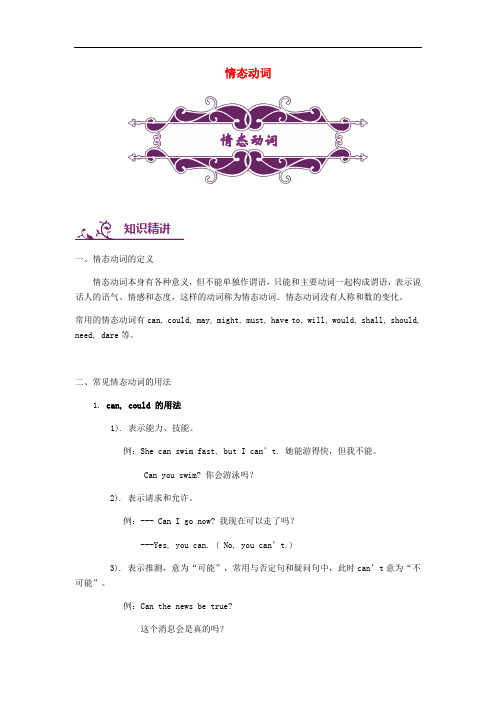
情态动词情态动词知识精讲一、情态动词的定义情态动词本身有各种意义,但不能单独作谓语,只能和主要动词一起构成谓语,表示说话人的语气、情感和态度,这样的动词称为情态动词。
情态动词没有人称和数的变化。
常用的情态动词有can, could, may, might, must, have to, will, would, shall, should, need, dare等。
二、常见情态动词的用法1. can, could 的用法1). 表示能力、技能。
例:She can swim fast, but I can’t. 她能游得快,但我不能。
Can you swim? 你会游泳吗?2). 表示请求和允许。
例:--- Can I go now? 我现在可以走了吗?---Yes, you can. ( No, you can’t.)3). 表示推测,意为“可能”,常用与否定句和疑问句中,此时can’t意为“不可能”。
例:Can the news be true?这个消息会是真的吗?This can’t be done by him.这个不可能是他干的。
4). 在疑问句中,此时could并不是can的过去式,只是表示委婉的语气。
例:--- Could you do me a favor? 您能帮我个忙吗?--- Yes, I can. ( No, I’m afraid not.)是的,我能。
(不,我恐怕不能。
)5). 表示客观可能性(客观原因形成的能力)。
例:They’ve changed the timetable, so we can go by bus instead.他们已经改变了时刻表,因此我们可以乘公交车去。
This hall can hold 500 people at least.这个大厅至少可以容纳500个人。
2. may, might的用法1). 表请求和允许,might比may语气更委婉,而不是过去式。
- 1、下载文档前请自行甄别文档内容的完整性,平台不提供额外的编辑、内容补充、找答案等附加服务。
- 2、"仅部分预览"的文档,不可在线预览部分如存在完整性等问题,可反馈申请退款(可完整预览的文档不适用该条件!)。
- 3、如文档侵犯您的权益,请联系客服反馈,我们会尽快为您处理(人工客服工作时间:9:00-18:30)。
2018中考语法讲解与练习7——情态动词英语语法是英语的重要部分,在中考的选择题、语法填空、改错、造句以及作文都会涉及,本套练习从既有讲解又有练习,是复习的好资料,提分的好助手。
语法讲解:①常见的情态动词有:can (could) ,may (might), must ,shall (should), will (would), dare (dared) , need等,另外,have to、had better也当作情态动词使用。
情态动词后面必须加动词的原形。
②can表示体力、脑力方面的能力或客观的可能性。
口语中, 在询问或说明一件事可不可以做时,常用“can”代替“may”。
情态动词“can”的过去式是“could”,否定式是“cannot”通常缩写成“can’t”,“could”的否定式是“could not”,通常缩写成“couldn’t”。
如:Can I help you?(要帮忙吗?)/ He can swim.(他会游泳)/ That can’t be Mr Li.(那不可能是李先生)③may表示允许、请求或可能性,用may提问时,肯定回答一般用Certainly或Yes,you may.;否定回答一般用can’t或mustn’t. 如:May I ask you a question?—Certainly.(可以问你一个问题吗?当然可以)/ You may go now.(现在你可以走了)/ It may be in your pocket.(它可能在你的衣袋里)④must表示“必须”、“一定”的意思。
表示“必须”时否定形式是mustn’t;表示“一定”时,否定形式是“can’t”如:We must be very careful when we cross the road.(我们过马路时一定要非常小心)/ It must be Jack.(那准是杰克)/ I haven’t seen Kate today.She can’t be here.(我今天没有看到过凯特,她不可能在这里) [注意]用must(必须)进行提问时,肯定回答用must,否定回答用needn’t;用must(一定)进行提问时,肯定回答仍用must,但是否定回答用can’t.如:Must we clean the room before we leave? –Yes,you must.或No,you n eedn’t.(我们走之前必须要打扫房间吗?是的,必须打扫。
/ 不,不需要。
)/ Must she be in the romm?–Yes,she must.或No,she can’t.(她一定在房间里吗?是的,一定。
/ 不,不可能在。
)⑤“have to”表示“不得不”、“必须”。
We’ll have to leave now for it is very late at night.have to的疑问形式是:助动词+…+have to,否定形式是:助动词+not+have to或者用ne edn’t.如:Do you have to stay until 8 o’clock?(你得呆到8点钟吗?)/ You don’t have to do so.(=You needn’t do so.)(你不用这么做)⑥shall在问句中,可表示征求对方意见,与第一人称连用;在陈述句的第二、三人称的主语后或表示“命令”、“警告”、“允许”等。
如:Shall we go to the zoo this weekend?(我们这个周末去动物园好吗?)/ He shall bring his own book next time.(他下次必须带自己的书来)⑦should可表示“劝告”、“建议”、“惊奇”等意思。
We should speak to old people politely.(我们应该礼貌地对老人讲话)⑧will表示“意愿”、“决心”等意思,一般与第二人称连用。
如:Will you please close the door for me?(请你替我把门关上好吗?)/ I will teach you a lesson.(我要教训你一顿)⑨would表示过去的“意愿”、“决心”等。
He would sit near the fire every time he returned home.(每次他回到家中总要坐在火炉边)would也可以表示现在的情况,表达说话人向对方提出的要求,语气比“will”婉转、客气。
在日常会话中,“我想要…”通常用“I would like to”或“I should(I’d) like to”来表示。
如:Would you like to havea rest at the moment?(你现在想要休息一下吗?)would还可以表示过去经常发生的事情。
如:Every year parents would tell their children about the boy who would save his people.(每一年父母们总是向孩子们讲述这个将会拯救他的人民的男孩的事) ⑩need表示“需要”,用于疑问句或否定句。
“need”作实义动词时,在肯定、否定、疑问句中都可以用。
如:He needn’t do it in such a hurry.(他不需要如此匆忙地做这件事)/ He needs some help.(他需要一些帮助)/ He doesn’t need to bring his football socks then.(那么他就无须带上足球袜了)⑾dare是“敢”的意思,用法几乎与“need”完全相同,即在疑问句和否定句中,可以作情态动词,后面用不带“to”的动词不定式。
在肯定句中和实义动词一样,后面的动词不定式要带“to”。
How dare you say I am a fool?(你竟敢说我是个傻瓜?)/ He didn’t dare to touch the red button.(他不敢触碰那个红色的按钮)⑿‘d better(do)(“最好是”)一般也当作情态动词使用,否定式是:’d better not (do). 如:You’d better sit here and say nothing.(你最好坐在这儿不讲话)/ You’d better not speak because he is sleeping.(你最好不要讲话因为他正在睡觉)练习1、–May I use your pen? Mine are left at home.--Of course you ________. Here you are.A. mustB. shouldC. needD. can2、--- Listen! David is talking happily with his mother in the next room.--- It ______ be his mother. She has gone to Yunnan to be a volunteer doctor.A. shouldB. mustC. can’t D. mustn’t.3、—May I watch TV for a while, Mum?—Yes, but you finish your homework first.A. mayB.must C.need D. can4、― Excuse me,is Jim in the classroom now?― He _____ be in the classroom because I saw him go to the post office just now.A.must B.mustn’t C.can’t D.needn’t5、— Are you going to Beijing by air?— It’s fast, but expensive. So I’m not sure. I _____ take a train.A. mayB. willC. mustD. should6、—I left my dictionary at home.Could I use yours?—Yes, you ________.A.can B.could C.should D.must7、It’s my turn to be on duty today. You ___________ clean the classroom.A. may notB. needn’tC. mustn’tD. can’t8、—________ you come with me to Lang Lang's piano concert this evening?—I'd love to, but I have to study for my math test.A.Should B.May C.Must D.Can9、— Excuse me, whose French book is this?—It be Tom’s. In our class, only he is studying French.A. mustB. can’tC. May10、﹣He______be in the classroom,I think.﹣No,he____be in the classroom.I saw him go home a minute ago.A.can; may not B.must; may notC.may; mustn't D.may; can't11、Just like weather, life_______ be sunny and beautiful all the time.A. mustn’tB. needn’tC. can’tD. wouldn’t12、Look! The traffic light has turned red.We ________ stop our car.A.can B.can't C.must D.mustn't13、—Mum,________ I visit the Modern Art Museum next Monday?—I'm afraid you can't.All the museums in this city are closed on Monday.A.would B.need C.should D.may14、Tommy,________ play basketball in the street next time.You may get hit by a car.A.do B.don't C.must D.mustn't15、–Must I practice the violin right now?--No, you _____. You ______ do it later on.A. mustn’t; mayB. shouldn’t; mightC. needn’t; mayD. needn’t; must16、We think that everyone _______ use public transportation.A. mustB. shouldC. couldD. might17、---What do you want to eat for lunch? I will prepare earlier today.--- Honey, you _______. Let’s go out to have something different.A. mustn’tB. don’t have toC. shouldn’tD. can’t18、The sign says “Passengers ____ show their tickets and passports.”A mustB mayC canD should19、---I’m leaving now.---It’s so late.Better stay with me. Call a taxi if you _______.A. willB. mustC. wouldD. may20、单项选择—There is somebody at the door. Who ______ it be? Is it the postman?—No. It _______ be him. It’s just 7:00 o’clock. It’s too early.A. may, mustn’tB. may, can’tC. must, needn’tD. can, may not21、When a virus comes into our body, we get ill. The same thing also happen to a computer.A. shouldB. needC. canD. must22、—Someone is knocking at the door, Is it Tom?—It _____him. He has gone to Beijing.A. may not beB. can’t beC. mustn’t be23、—Mom, must I take out the trash now?—No, you ________. You may take a rest first.A. mustn’tB. can’tC. shouldn’tD. don’t have to24、—Will Jim fly to Taiwan for a holiday?—He _____try. In fact, it depends on how much the journey costs.A. mayB. has toC. needD. must25、—Dad, shall we go to the World Park tomorrow?—Sorry. I won’t be free, but you ______ ask Mum to go with you.A. mustB. may C would D. should26、—The experiment seems difficult. Would you mind doing it for me?—Why not do it by yourself? I show you how to do it if necessary.A. canB. needn’tC. mustD. shouldn’t27、﹣﹣﹣ you leave now?You only arrived here an hour ago.﹣﹣﹣Sorry,but so much homework is waiting for me.A.May B.Can C.Must D.Should28、—Is John coming by train?—He should, but he not. He likes driving his car.A. canB. mayC. mustD. need29、Necessary action be taken to protect the environment so that we can have a better world.A.can B.must C.may D.might30、–Is Mike coming to the fashion show tomorrow?--I’m not sure. He ______ not come.A. mustB. canC. mayD. should31、The girl go to the hospital with her mother last night.A. needB.will C.can D. might32、The magazine be Lily's, for we can find her name on the cover.A. mayB.might C.could D. must参考答案一、选择题1、D2、C3、B4、C5、A6、A7、B。
